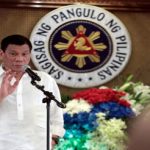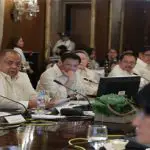Dean of the De La Salle University College of Law, Jose Manuel Diokno,on Tuesday, October 18, said that the participation of the military in the war on drug is questionable, whether the country is in a state of national emergency or not.
According to the DLSU College of Law Dean, President Rodrigo Duterte should explain to the people why he is not lifting the “state of national emergency” that he proclaimed a month ago.
“Well I think the people should know whether there’s still a basis to continue the implementation of the national state of emergency,” Diokno said in a Rappler interview.
Last September 3, President Duterte declared that the Philippines was in a “state of lawlessness” after a bombing in Davao City that left 14 people dead and more than 60 people injured.
It said in the proclamation, that he signed before leaving for the ASEAN Summit in Laos, that it “shall remain in force until lifted or withdrawn by the President.”
Diokno then pointed out how suspects in the Davao City bombing have been apprehended, which put into question why the Philippines is still under the state of lawless violence.
[ads1]
Defense Secretary Delfin Lorenzana said that the case of the Davao bombing is now closed after three suspects had been arrested in a Cotabato City checkpoint last October 4. The three suspects allegedly had a direct participation in the bombing and were described as “students of Marwan”, or the late Malaysian bombmaker Zulkifli bin Hir.
The proclamation released to the media on September 3 indicates the command of President Duterte for “the Armed Forces of the Philippines (AFP) and the Philippine National Police (PNP) to undertake such measures as may be permitted by the Constitution and existing laws to suppress any and all lawless violence from spreading and escalating elsewhere in the Philippines with due regard to the fundamental civil and political rights of our citizens.”
It cited the Davao City bombing, the Maute prison escape of terrorists, beheadings by the Abu Sayyaf of its hostages, and the deaths of 15 soldiers in an Abu Sayyaf encounter as the basis for the proclamation of the “state of lawlessness” of the country.
President Duterte mentioned on September 3 that this declaration was done to ensure “coordinated efforts” between the police and the military in the fight against terrorism and war against illegal drugs.
However, Diokno said that the participation of the military in the war on drugs is questionable even considering that the country is in a national state of emergency.
“I don’t think that they’re allowed to participate in the war on drugs based on the state of national emergency because if you look at the rationale, it really is the Davao bombing,” Diokno explained.
“In fact, even without the state of national emergency, there would be a lot of questions whether the military can be involved in crime control because it is really the jurisdiction of the national police. Our constitution does make a distinction between what our national police can do and what our military can do,” Diokno said pertaining to the Philippine laws and the 1987 Constitution where it indicates that there is a difference in responsibilities of the PNP and the AFP.
“I really don’t know what [Duterte]’s basis is because under the laws and the Constitution, that’s the responsibility of the police, not the military. That can be questioned the court,” Diokno added.
Source: (rappler.com)
[ads3]


